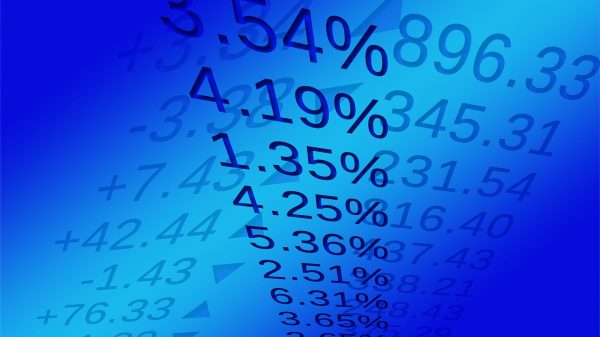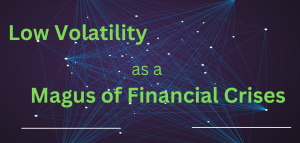By Pascal vander Straeten December 16, 2023
The CEOs of America’s largest publicly traded companies have been talking about geofinance (cf. the interactions between geopolitics and the realm of finance/ economics) this year. During the explanations they give every so often about their company results, they mention the word almost 12,000 times. That is nearly a threefold increase compared to just two years ago. Some large hedge fund managers are even more explicit. The world totally depends on leaders’ common sense to avoid Armageddon. It is the most dangerous geopolitical environment ever seen, with the risk of a chain reaction that could lead to a world war, as was the case with the First World War.
When looking at the world through a geopolitical lens and trying to translate this into the economy and the financial markets, there is little reason to be cheerful either. Our blissful break from history is over. We have lived in a perfect moment for the past 75 years. Under the security blanket of the United States and blessed with a post-World War II baby boom, the global economy thrived in relative peace for decades. After the collapse of the Soviet Union, globalization helped billions of people escape poverty. Unfortunately. It will never be this good again for the rest of our lives because the world is falling apart. Most countries will never return to the stability and growth they enjoyed in 2019. A world marked by an ageing population and deglobalization calls for a new economic model.
Thus, we should brace ourselves for a more unstable world. This is partly the result of the US, which no longer functions as a stabilizing, hegemonic superpower. That loss threatens to make the next world recession even more painful. During the pandemic, everyone was still rowing in the same direction to keep the economy above water. This gave you a globally coordinated stimulus. But what about the next recession, without a pandemic, with the US increasingly turning back on itself? Stimulus is then in danger of being replaced by protectionist policy. This fits the picture of a deglobalizing world with tariff walls and rival power blocs.
Some argue that far-reaching deglobalization needs to be more evident, given the intertwining of global supply chains. But globalization is over. Referring primarily to the US, nobody there talks about free trade as a goal or an instrument. It is only about reversing free trade to ensure security, including jobs. “America First” is mainstream today. Additionally, if you link geopolitics to demography, globalization helped much of the world industrialize and urbanize, typically accompanied by a declining birth rate. This is the decade in which ageing will hit the world through a massive wave of retirements in countries such as Germany, Italy, South Korea and China. This is an enormous group of people who were collectively the largest taxpayers in history and were also very productive. Now, they must be cared for by the state without generating income and consumption.
The next generation needs help to absorb this, resulting in a decline in consumption, trade and investments. It is the death knell for globalization, and capitalism is also under pressure. A new economic model must occur in which consumption and production are not driven by population growth as in previous decades. There will also be less capital for innovation because the largest producers of capital have retired. What that model will look like is anyone’s guess. Governments may have a more significant role down the road, which will have to decide how to distribute scarcer goods.
Meanwhile, signals are emerging that the economic fragmentation of the world into rival blocs is indeed underway. A study by Bloomberg Economics shows that foreign investments are happening more than before in countries that belong to the same camp. As a criterion for the latter, Bloomberg looked at the voting behaviour of countries in the United Nations (UN).
Countries that did not condemn Russia’s invasion of Ukraine received only 15% of global foreign investment in long-term projects such as factories in the past two years. In the decade up to and including 2019, this was still an average of 30 per cent. China and Russia are taking the biggest hit. Foreign investments in China, including Hong Kong, shrank from almost 11 per cent in 2010-2019 to less than 2 per cent in 2022. There is hardly any investment in Russia. International trade now also takes place more along geopolitical boundaries. Since the invasion of Ukraine, trade between two hypothetical power blocs (according to voting behaviour in the UN) has grown 4 to 6 per cent slower than trade within those power blocs. This is what estimates from the World Trade Organization show. China’s share of total Asian exports is currently experiencing the most significant contraction in the past two decades due to international companies rearranging their supply chains away from China.
Economists warn of the costs associated with deglobalization, from higher inflation due to less cost-efficient supply chains to reduced innovation due to less international cooperation. But it is too easy to dismiss this as lousy protectionism. Industrial policies such as those of the American Biden administration, with its green subsidies and emphasis on American jobs, are seen as a correction to the derailed hyper-globalization that swept the world from the 1990s. This globalization was tailored to multinationals with political connections, ignored social and environmental damage, and sidelined national governments in more and more areas. It is good that governments are again taking the reins to meet national needs, using the decades after the Second World War as a model.
However, one must acknowledge that the world looks different now. At that time, the Soviet Union was hardly integrated into the world economy as a significant rival of the West. With China today, it is very different. The great danger is that the US and China mismanage their geopolitical competition. But there are other solutions than a return to the 1950s. The world then partly benefited from the industrial reconstruction after the war, both in Europe and Asia. That resulted in an enormous growth engine separate from international trade. It is not a given that the world should move towards a silver lining of free trade. We also return to the many centuries in which competing powers determined trade.
The US retreat has another consequence that became apparent in 2023, but investors ignored it. More and more scores are being settled between countries and between regions. Everyone focuses on the war in Ukraine and the Israel-Gaza conflict. But countless conflicts emerge in the shadows: between Azerbaijan and Armenia, between Kosovo and Serbia. Those conflicts were frozen for a long time. But now that the cat is away – the US and Russia have other concerns – the mice are dancing on the table. This will only accelerate in 2024. Investors should take better account of the fact that conflict regions can contain crucial raw materials.
The world’s most important elections will take place next year in the US, the leading superpower until further notice. According to current polls, Donald Trump can quickly retake the White House, so the stakes are even higher than usual. A Trump return would be the most significant political earthquake in the country since the Civil War. Trump’s shadow also hangs over America’s central bank (Fed), with significant consequences for the financial markets and the fight against inflation. The Fed will implement a more flexible policy out of fear of a Trump election. In concrete terms, if the American economy threatens to head towards a recession, the Fed will cut its policy interest rate more sharply than anticipated and thus provide the economy with abundant oxygen. The reason is simple. If a recession breaks out, Joe Biden can forget about his re-election. History teaches us that. The Fed will pursue a more flexible policy than expected, even without a recession threat. It is not illogical that Fed directors, as part of the establishment, fight back against an outspoken anti-establishment politician like Trump. Fed governors are not machines but people who see the polls. They can even justify to themselves that a political bias in their policies is consistent with their mandate to keep inflation under control because the greatest danger to inflation is a re-election of Trump.
Trump is a populist who wants to turn on the money tap to boost nominal gross domestic product (GDP) growth, pressure the central bank to implement accommodative policies and roll out import tariffs. Each of those three things threatens to fuel inflation. For example, Trump and his advisers are planning a ring of import tariffs around the American economy, with a 10 per cent tariff on all foreign goods. That risks raising prices. The consequence of an overly accommodative Fed next year is that it could reignite US inflation, which could spell trouble in 2025. But the reasoning is that with Biden, there is a president who offers a more significant opportunity to solve that problem.
Coincidence or not, the Fed set the financial markets on fire this week, projecting that three interest rate cuts are in the pipeline next year. That was more than expected and the ideal fuel for a stock rally. It is consistent with the belief that markets remain in a structural ‘mania’, with relatively cheap money likely to revive inflation. For investors, this means investing in tangible assets such as raw materials and avoiding bonds this decade. However, some might argue that with Trump as a candidate, the Republican Party will face a catastrophic election defeat. ‘He is unpalatable to independent voters. They also voted en masse for the Democrats during the past midterm congressional elections.
With the recent election victories of the radical right-wing Geert Wilders in the Netherlands and the anarcho-capitalist Javier Milei in Argentina, a potentially destabilizing anti-establishment wind seems to be blowing. Although Argentina is a particular case – a country with many possibilities chronically mismanaged by its politicians – Milei’s election is ‘interesting’. And this is because he promises to put a chainsaw in the generous government to control Argentina’s debts and sky-high inflation. Milei promises significant cuts and pain. It could be the start of a shift away from wasteful populism. However, getting there in a country like the US will take a long time. The pain has to become even greater there first.
One should only read a little into Wilders’ victory, certainly not regarding the stability of the European Union and the eurozone. ‘Wilders only became an eligible candidate after he moderated his anti-European discourse. I am okay with the survival of Europe for the next ten years. Wilder’s victory clarifies that there is a political limit on continued support for Ukraine. Ukraine and the West have won the war because it has remained an independent and sovereign country, and Russia has only been able to occupy a limited part. Do European citizens want to continue sending billions to Ukraine and risking their energy supplies? Politicians may have to moderate to avoid people like Wilders, who are pro-Russia, getting the wind in their sails.
The question is not whether there will be a trade war between China and Europe, with electric cars as the focus. The trade war is already underway. China realizes it will not build an economy driven by growing domestic consumption. And so Beijing sees Europe as the valuable idiot on whom the Chinese can dump their products en masse. Europe has become less naive, and Brussels now sees China as the biggest problem, albeit years behind the US. Meanwhile, the clock is ticking for the US and Europe to reduce their dependence on China as the world’s factory. China’s horrendous ageing rates mean it has at most ten years before it ceases to exist as a unified, industrialized economy. Everything falls apart once the central authority crumbles, as in the previous region collapses.
That may happen even faster. The problem is the personality cult that President Xi Jinping has created around himself. There is no one else left. The flow of information could be better because China simply no longer makes data. This means that there is no insight into the system. And so, the West had better speed up rebuilding an industrial base outside China. That process is underway. But we have to do the work of 35 years in the next five years.







